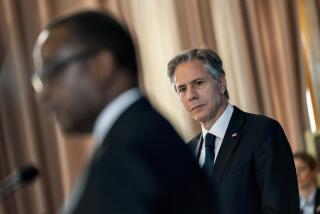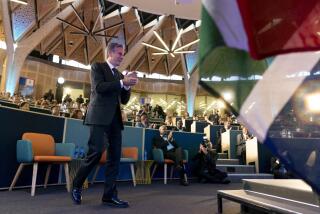8-Year Struggle Against Skeptics : U.S. Mediator Gambled on ‘Long View’ and Won
- Share via
BRAZZAVILLE, Congo — When Chester A. Crocker began the delicate task of selling his peace plan for southwestern Africa nearly eight years ago, he remembers plenty of resistance in African capitals.
“There was a lot of broken furniture in the room during the first 18 months,” said the 46-year-old assistant secretary of state.
The notion of linking a Cuban troop withdrawal from Angola with independence for Angola’s South African-controlled neighbor, Namibia, wasn’t all that popular with any of the principal players.
Even when he got the three parties--Cuba, Angola and South Africa--to sit down at the same table earlier this year, “there was a lot of suspicion and long hours of distrusting one another,” South African Foreign Minister Roelof F. (Pik) Botha said Tuesday. “But the attraction of peace and stability eventually got us together.”
After 11 trilateral meetings, five of them in the Congo, Crocker and representatives of the three countries walked down a red carpet before a phalanx of television cameras Tuesday to make the agreement official. Only a formality, the signing of a treaty next week, remains.
“The President (Reagan) felt from the beginning it was worth taking a long view on this one,” Crocker, the soft-spoken African specialist in the State Department, said in an interview in Brazzaville this week. “Stakes were high. But we really had no alternative, apart from taking a walk.”
The peace process was fraught with setbacks, and Crocker himself was often criticized in Washington and elsewhere for pursuing what seemed a hopeless goal.
As the architect of the Reagan Administration’s policy of “constructive engagement” in South Africa, he became the focal point for American frustration with Pretoria after the outbreak of unrest in South Africa’s black townships in 1985.
When Congress imposed sanctions against South Africa, over President Reagan’s veto, the peace process in Angola stalled. Pretoria was angry about sanctions. And black-ruled countries on the so-called front line with South Africa, including Angola, thought the United States wasn’t doing enough to snuff out apartheid, the South African system of racial separation.
It was a time “characterized by long periods of silence,” Crocker now says.
But the former academic, a one-time adviser to Republicans in Congress, persevered with a style that suits Africa. He made dozens of trips to the continent, some of them secret, to meet face-to-face with Africa’s leaders, including the Angolans, with whom the United States has no official diplomatic relations.
“We’re dealing with a region where personalities make a great deal of difference, where body language means a lot,” Crocker said.
He eventually won their confidence as mediator.
His approach was to “create facts”--incremental agreements that the countries would find difficult to walk away from without embarrassment. Cautious and deliberate by nature, Crocker sought to encourage changes in South Africa and throughout southern Africa by showing a willingness to help.
“If there’s a logical structure in place, with something for everyone, you can envisage a peace without losers,” he said.
Major Political Success
The peace initiative has been considered a major political success for the Reagan Administration, although it was a combination of factors that finally brought Cuba, Angola and South Africa to the table, most political analysts say.
South Africa’s leaders were concerned about the cost--in money and lives--of their protracted military effort in southern Angola. Increasingly, it became apparent that the war there was not winnable.
Pretoria also faces economic difficulties because of its growing isolation from the rest of the world, and it needs to improve its image to secure international loans and investments.
Meanwhile, Angola’s economic situation has become desperate, and it needs Western assistance for development.
But probably the most significant factor in bringing Angola and Cuba to the table was the Soviet Union. U.S.-Soviet relations matured earlier this year, and the Soviets, intent on cutting their own military investments in Africa, agreed to work with Crocker in bringing peace to southern Africa.
The Soviet Union supported Crocker’s role as mediator and urged Angola and Cuba to negotiate.
“They (Cuba and Angola) are our friends, and we acted as friends who wanted a solution,” Soviet Deputy Foreign Minister Anatoly L. Adamishin said Tuesday.
Nevertheless, it was Crocker’s patience that was rewarded Tuesday.
The Cubans, Angolans, South Africans and even the Soviets praised the mediator for his “brilliant” role in the process.
“This job is something I feel I’ve spent a good deal of my life preparing for,” Crocker said, relaxing in his suite at a Brazzaville hotel before heading for the airport Tuesday. “There isn’t anything I’d rather be doing.”
More to Read
Sign up for Essential California
The most important California stories and recommendations in your inbox every morning.
You may occasionally receive promotional content from the Los Angeles Times.














